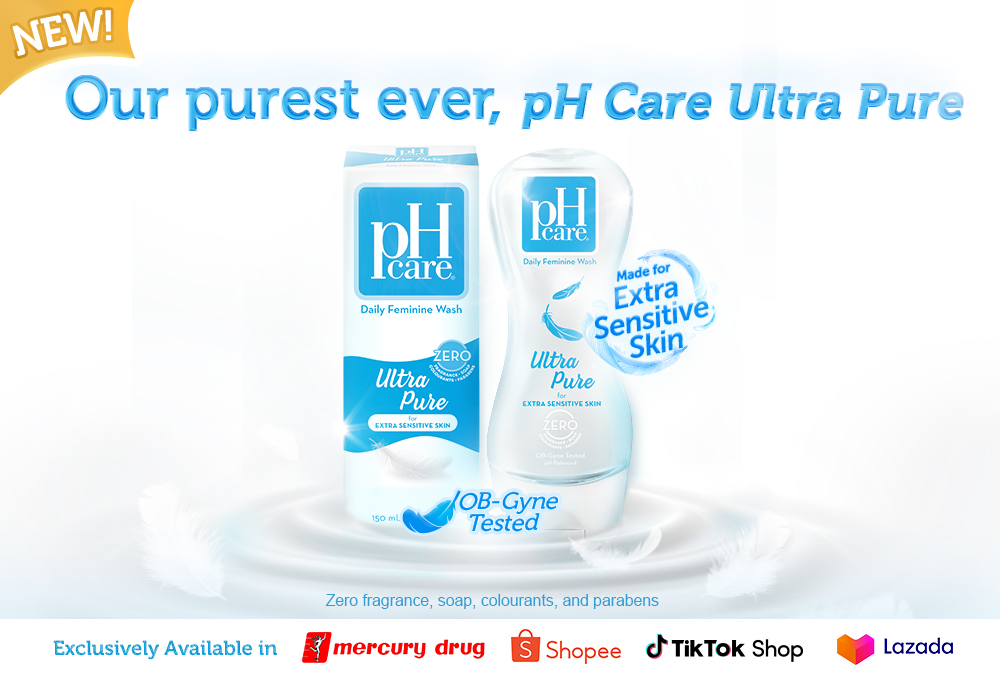Your Ultimate Fem Care Crash Course

We probably don’t need to tell you how important your feminine area is. And yet millions of women still haven’t figured out the best way to give it the TLC it really needs. Feminine hygiene can be tricky, and going about it the wrong way often leads to discomfort, itching, and odors. Here, we break down the essential steps that’ll keep your lady parts healthy and happy.
These things can mess with not only a woman’s overall health, but her self-esteem as well. So before this leads to something worse, here’s a rundown of expert-approved pointers for daily feminine care you can follow to avoid this.
1. When to start
Your first period brings about a lot of changes in your body. This being said, this is the time for you to be more mindful of your personal care. Taking a conscious effort to dedicate a routine for your feminine hygiene will go a long way in keep your v zone clean and healthy.
2. Practice proper intimate hygiene
This might seem like a no-brainer but many women still don’t do what it takes to keep themselves clean down there. Make sure to pat yourself clean after using the toilet, and go from front to back to avoid bacterial contamination. Use clean underwear always, and make sure to regularly change your tampons and pads. And perhaps most importantly, avoid harsh soaps and choose a feminine wash like pH Care, that’s specifically formulated with the right pH level of 5 to care for your lady parts. Lastly, knowing how often to use these products is just as important. Make sure to cleanse your feminine area daily – when you shower in the morning and when you wash up at night. It is important to wash away the bacteria to keep odor, itch and irritation at bay.
3. Avoid douching
You might have been taught to clean your vagina using the method of douching, which comes from the French word for washing or soaking. This is usually done by squirting a solution purchased from pharmacy into your vag. This however interferes with your feminine area’s natural flora, and does nothing except mask the odors caused by infection. Your best bet is to keep yourself clean with products that are designed for these sensitive areas, and that promote balance.
4. Grooming your pubes
Most experts will tell you to leave your pubes alone, because it serves as a layer of protection that keeps bacteria from entering your vagina. However, the choice is yours to make. If you prefer to go hair-free, waxing and shaving are okay as long as you are cautious and hygienic in your ways. Make sure your razors are clean, and replace them every month. Waxing is best left to the professionals, so have it done at credible salons and follow their post-wax care instructions.
5. See your doctor regularly
Aside from seeing your going as needed, i.e. when there is discomfort or pain, it’s also good practice to set an appointment with your gynecologist for a pap smear every year from the age of 21. This will allow you to detect any changes in the cells of your vagina, helping you prevent and diagnose various diseases. But while getting tested regularly is important, the most important thing is to prevent these diseases in the first place by following the steps above!
6. Use clean, dry clothing (especially underwear!)
Don’t let yourself stay in wet clothing for extended periods of time. This will turn your feminine area into a breeding ground for bacteria. Change into clean clothes right after swimming or working up a sweat in the gym instead of letting your clothes dry on your body. Favoring breathable cotton underwear also helps, instead of tight fabrics that trap moisture where you don’t want it.
7. Eat Healthy
Yes, your diet also contributes to vaginal health. Foods that are rich in probiotics like yogurt have been found to prevent yeast infections, while cranberry has proven effective against urinary tract infections. Eating minimally processed, nutrient-dense foods also help one’s overall physical and mental health, and because our body parts function as interconnected systems, maintaining a reasonably healthy diet will also keep your vag in good shape.



.jpg)


